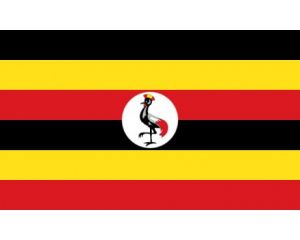Language/Ganda/Grammar/Questions
Hi Ganda learners! 😊
In this lesson, we will learn about questions in Ganda. Knowing how to ask questions is essential for communication in any language. We will explore the different question words and the sentence structures used in asking questions in Ganda. As always, we will also share cultural information and interesting facts along the way. If you have any questions, feel free to ask in the comments below. 🙋♀️🙋♂️
Take some time to dive into these other pages after completing this lesson: Adjectives, How to Use "Be", Negation & Pronouns.
Basic Questions[edit | edit source]
There are several ways to ask a question in Ganda. One common way is to use the question word "yatonde?" which means "what?". For example:
| Ganda | Pronunciation | English |
|---|---|---|
| Yatonde ekiwo? | /ja.tɔ́.nde ə.kì.wo/ | What is this? |
You can also use the question word "ki?" which means "who?". For example:
| Ganda | Pronunciation | English |
|---|---|---|
| Ki yategeza? | /ki ja.tè.gé.za/ | Who spoke? |
To ask "where?", you can use "eki?" . For example:
| Ganda | Pronunciation | English |
|---|---|---|
| Eki munyumba? | /è.kì mu.ɲùm.bà/ | Where is the house? |
To ask "when?", use "omu?" . For example:
| Ganda | Pronunciation | English |
|---|---|---|
| Omu lwaki? | /ò.mù lwa.kì/ | When? |
To ask "why?", use "lubwiisi?" . For example:
| Ganda | Pronunciation | English |
|---|---|---|
| Lubwiisi oli munywanyi? | /lu.bwìː.si ɔ.lì mu.ɲwà.ɲì/ | Why are you angry? |
Sentence Structure[edit | edit source]
In Ganda, the word order for questions is usually the same as in statements. However, there are some changes in intonation and the use of question words. For example:
| Ganda Statement | Pronunciation | English Statement |
|---|---|---|
| Owulira buli lunaku. | /ò.wù.lì.ɾà bu.lì lu.na.kù/ | You eat every day. |
| Owulira buli lunaku? | /ò.wù.lì.ɾà bu.lì lu.na.kù/ | Do you eat every day? |
As you can see, the only difference in these sentences is the rising intonation in the question. In addition, the question word "yatonde?" can be added to clarify the question.
Here's another example:
| Ganda Statement | Pronunciation | English Statement |
|---|---|---|
| Nabudde mu kisenge. | /na.bùd.dè mu ki.sè.ŋé/ | I am sitting in the chair. |
| Nabudde mu kisenge? | /na.bùd.dè mu ki.sè.ŋé/ | Am I sitting in the chair? |
Again, the only difference is in the intonation.
Practice Dialogue[edit | edit source]
Here's a practice dialogue to help you see the words in context.
- Person 1: Oli muzungu nnyo? (/ɔ.lì mu.zùŋù nn.yò/ - Are you a foreigner?)
- Person 2: Nedda, mmanyi nnyo. (/nèd.dà, m.màn.yì nn.yò/ - No, I'm local.)
- Person 1: Oli wa? (/ɔ.lì wà/ - Who are you?)
- Person 2: Ndi musomesa. (/n.dì mu.so.mè.sà/ - I am a student.)
Interesting Facts[edit | edit source]
Did you know that "ki?" meaning "who?", can also be used as a greeting in some parts of Uganda? It's a casual way of asking someone "how are you?" or "what's up?". So, if someone greets you with "ki?" in Uganda, they are not asking for your name, but simply saying "hi"!
In Conclusion[edit | edit source]
Now that you have learned about how to ask questions in Ganda, you can practice with a native speaker on Polyglot Club. Remember to use the question words we discussed, and don't be afraid to make mistakes. It's all part of the learning process. Don't forget to check out our Grammar page for more Ganda language lessons. 📚🌍
➡ If you have any questions, please ask them in the comments section below.
➡ Feel free to edit this wiki page if you think it can be improved. 😎

